International students feel pressure to transfer to economics department to increase likelihood of acquiring a work visa
Evan Robinson-Johnson/Daily Senior Staffer
The Technological Institute, where many McCormick classes are taught.
April 30, 2019
As work visas grow increasingly hard to acquire, many international students feel pressure to join the economics department, forced to sacrifice passions for job opportunities.
The stress arises after NU’s decision to reclassify economics as a science, technology, engineering and mathematics major was authorized by the Department of Homeland Security in May 2018.
The reclassification will increase opportunities in the U.S. for international students who pursue a major in economics. After graduation, students majoring in STEM fields are allowed to remain in the country two years longer than those studying other subjects.
Ravi Shankar, director of the International Office, said the regulation exists because of increased workforce shortages within STEM fields.
“There is a great deal of need in STEM fields, as not as many U.S. workers want to go into STEM,” Shankar said. “There is a shortage of specialists in this area.”
He said the extended period also gives employers more opportunities to acquire work visas for desired candidates, rather than losing the chance to hire an employee at all.
Although the reclassification benefits international students already studying economics, students outside the field feel an obligation to sacrifice other interests in order to remain in the U.S. after college.
Communication freshman Emily Yan is double-majoring in radio, television and film and economics. An international student from China, she said the visa extension period influenced her decision to choose economics as a second area of study.
“I don’t hate econ, but I also don’t love it,” Yan said. “If it weren’t for the job opportunities, I wouldn’t take on (this) major.”
She said the choice prevented her from pursuing psychology, a field in which she is much more passionate. The decision caused her anxiety, as she was often left conflicted over which major to pursue.
“It’s just sad that I can’t really do what I want to do,” Yan said. “Even though I know what I like, I can’t do it if I want to remain in the U.S.”
Weinberg sophomore Ananya Poddar had a similar experience. Although she enjoys economics and intended to declare the major even before it was re-classified, she said she was forced to drop her learning and organizational change double-major as a result of the regulation.
Poddar also struggled with a lack of clarity related to the new policy.
“At the time, I was told if I graduated from SESP, even as an econ double-major, (my degree) would not count as STEM, because my graduating school (would be) SESP,” Poddar said. “I wasn’t sure if this was true or not, but apparently that meant that I wouldn’t get the two extra years. So I switched back into Weinberg.”
Poddar said although she benefited from economic re-classification, it was frustrating to always have to “make decisions based off of that.”
Even though Poddar said she understands the intention behind the STEM regulation’s implementation, she finds the entire work visa lottery unfair.
H-1B visas are limited — more applicants exist than visas available. Therefore, international job applicants must enter a lottery to acquire an American work visa. They can only enter after securing a job, as the lottery requires sponsorship from an employer.
With more time in the U.S., STEM students have more opportunities to be selected for a visa.
“I get that they are trying to increase opportunities for citizens of the U.S, but in my opinion, if someone gets a job from a company, it’s clear that the company sees some value in that candidate over an American counterpart,” Poddar said. “So I think if you are able to get a job offer, you should be able to directly get a work visa.”
Yan said even more disappointing than visa extension limitations or difficult lottery systems are the scarce employment opportunities within the film industry for international students.
“The time isn’t what matters the most to me,” she said. “It’s that I know if I do RTVF, I know I’m not going to find a job, no matter how long I remain here.”
She said it is almost impossible to find employers within the film industry willing to sponsor a work visa.
Now, she plans to settle for a career in economics.
“I’ve just kind of learned to accept it,” Yan said.


